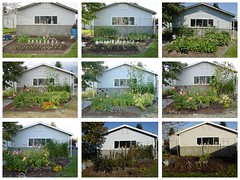
Frost hit on October 30th this year, which is pretty much dead average for our area. Luckily, I had enough advance notice to harvest the last tomatoes and dahlias of the season before the killing cold. I loved the bounty of San Marzano tomatoes that ripened on schedule this summer and fall, but it saddened me to see so many green fruit turned to mush. Next year, I will have to grow an earlier variety, or start my plants under lights.
Anyway, the past two weeks have been consumed with post-frost garden tasks. Digging, curing, cleaning, dividing, and packing dahlia tubers took a full week. The tomatoes had to be pulled out, along with the support twine. Another couple of days were spent raking leaves and piling them into the west flowerbed to be used as mulch. Now I'm down to the final stretch: amending the vegetable beds and mulching them in preparation for spring.
With almost everything else tucked in for the season, I want to get this stage over and done with, but I'm having a heck of a time deciding what to do about amending the beds. I've been reading Steve Solomon's Growing Vegetables West of the Cascades for the past couple of months, and have somewhat been of a mind to try out Solomon's compost mix (although I've heard he's changed the recipe since publication). The problem is, I can't see mixing up 200 pounds of the stuff, and even with a hefty discount at the farm supply store, it would still cost a pretty penny to make the attempt. I'm thinking that a few bags of soil conditioner and a bale of straw to cover will have to do it.
The more time passes, the more I understand some of the criticisms I've read about Solomon's book-- not only is it written with the small farm in mind (200 pounds of fertilizer!), but his goal is to grow the most nutritious vegetables possible by growing them in the best soil possible, pocketbook be damned. In this case, I think I'll go with the more moderate advice of nutritionist Marion Nestle-- more nutritious vegetables are a good thing, but the nutritional value of a vegetable is always going to more limited by its breeding than the soil in which it grows.
I guess I'll have plenty of time to contemplate the whole nature-vs.nurture dilemma now that our northwest winter rains have started. Methinks it's time to set in with a good gardening book and a sheaf of seed catalogs and start planning for the season to come.
---
Cross-posted to Vox.
